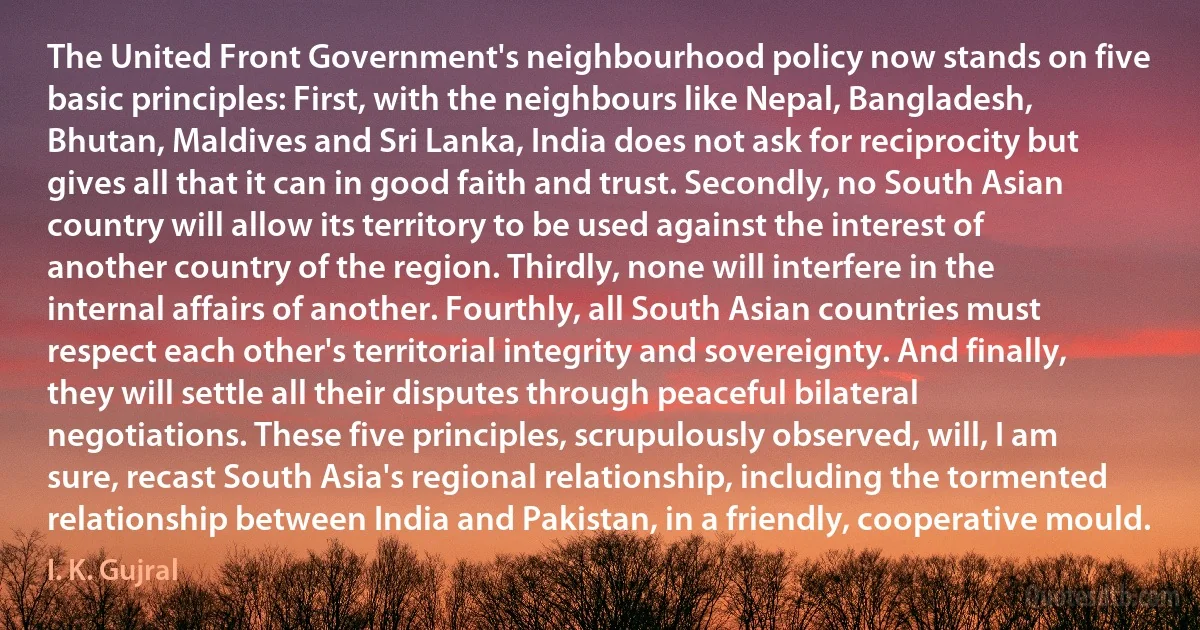South Quotes - page 35
The Gujral doctrine is a doctrine of good neighbourliness. In South Asia, India is the largest country and the largest economy. All the countries of the neighbourhood put together cannot match India. Therefore, it is my doctrine, that in the post-Cold War era, all the neighbours must look up to India as a friendly neighbour. For doing so, if concessions have to be given, they should. But these concessions do not include two things: no transfer of sovereignty of any part of India, including Kashmir; and second, we will not compromise on our basic secular, democratic polity. Minus these two factors, we are willing to give concessions as long as it does not hurt our defence.

I. K. Gujral
Where do Goldman and Eaton and Trautmann and Zelliot and Gold figure in the canon of South Asian Studies? Judging from the country where they work in, the United States of America, not very high. Were they to enter a seminar room at the Association of Asian Studies meetings there would not be the buzz that would certainly accompany the entrance of diasporic scholars ten times as glamorous but not half as accomplished.

Ramachandra Guha
Contrary to what is sometimes claimed in the press, there are many fine historians in India. From my own generation of scholars, I can strongly recommend - to student and lay reader alike - the work of Upinder Singh on ancient India, of Nayanjot Lahiri on the history of archaeology, of Vijaya Ramaswamy on the bhakti movement, of Sanjay Subrahmanyam on the early history of European expansion, of Chetan Singh on the decline of the Mughal State, of Sumit Guha on the social history of Western India, of Seema Alavi on the social history of medicine, of Niraja Gopal Jayal on the history of citizenship, of Tirthankar Roy on the economic consequences of colonialism, of Mahesh Rangarajan on the history of forests and wildlife, and of A. R. Venkatachalapathy on South Indian cultural history.

Ramachandra Guha
My Instrument being fixed, I immediately began to observe such Stars as I judged most proper to give me light into the Cause of the Motion... There was Variety enough of small ones; and not less than twelve, that I could observe through all the Seasons of the Year; they being bright enough to be seen in the Day-time, when nearest the Sun. I had not been long observing, before I perceived, that the Notion we had before entertained of the Stars being farthest North and South, when the Sun was about the Equinoxes, was only true of those that were near the solstitial Colure: And after I had continued my Observations a few Months, I discovered what I then apprehended to be a general Law, observed by all the Stars, viz.

James Bradley
The Battle of Midway was the first decisive defeat suffered by the Japanese Navy in 350 years. Furthermore, it put an end to the long period of Japanese offensive action, and restored the balance of naval power in the Pacific. The threat to Hawaii and the west coast was automatically removed, and except for operations in the Aleutians area, where the Japanese had landed on the islands of Kiska and Attu, enemy operations were confined to the south Pacific. It was to this latter area, therefore, that we gave our greatest attention.

Ernest King
Lois and I worked together in ‘Ladies Courageous' ten years earlier. We were roommates on our location shooting. I had a blind date and when Lois and I were going up the elevator with some servicemen, she pointed to a very handsome guy and said, ‘I'll bet that's him.' And it was! We've been married over 50 years now! I used to see Lois every week at church but lost touch after we moved south.

June Vincent
I think that's actually something that could hurt Trump in South Carolina and beyond if people start to see that he's not -- he says he's for the little guy, but he's actually built a lot of his businesses on the backs of the little guy and he's a lot of little guys through eminent domain, or through not paying contractors after you've built something. The little guys have suffered.

Kellyanne Conway
This country has become an independent Republic with complete sovereignty. This has been laid down in our Interim Constitution. This country is to be shared by the citizens, the Arabs and the Kurds. This entity is indivisible in any way. No one can divide nor disintegrate the Republic of Iraq from the North to the South and from the East to the West.

Abd al-Karim Qasim
In 1990, East Asia, South Asia, and Africa all had the same percentage of people living in extreme poverty: 55 percent. Now, East Asia is at ten percent, and South Asia has gone down to 30 percent. In Africa, it's still 55 percent. Why did we succeed in East Asia, and why are we falling behind in Africa? This year, we're going to be lending over $60 billion. That seems like a lot of money, but every year, sub-Saharan Africa requires about $100 billion in new investment in infrastructure.

Jim Yong Kim
But the foundation of ROK military power was the South Korean infantryman, courageous, tireless, hungry for the knowledge that would give him more power as a fighting man, disciplined and willing to die in the service of the cause for which his country fought and bled. You didn't have to tell a South Korean that communism was evil. It was an evil that had blighted his country and he saw it all around him, wherever he went.

Mark W. Clark
Trump is an ignorant demagogue who traffics in racist and misogynistic slurs and crazy conspiracy theories. He champions protectionism and isolationism - the policies that brought us the Great Depression and World War II. He wants to undertake a police-state roundup of undocumented immigrants and to bar Muslims from coming to this country. He encourages his followers to assault protesters and threatens to sue or smear critics. He would abandon Japan and South Korea and break up the most successful alliance in history - NATO. But he has kind words for tyrants such as Vladimir Putin. There has never been a major party nominee in U. S. history as unqualified for the presidency. The risk of Trump winning, however remote, represents the biggest national security threat that the United States faces today.

Max Boot
When the Armistice came back no one took time to tell us about it; November 11 was just another day of drilling on the Plain. I found out that the war was over only by courtesy of our "barrack policemen", the janitor who looked after the division of the old South Barracks where my "beast" company was quartered, who reported the war's end a couple of days after the fact.

Maxwell D. Taylor
I have been among the officers who have said that a large land war in Asia is the last thing we should undertake. Most of us, when we use that term, are thinking about getting into a land war against Red China. That's the only power in Asia which would require us to use forces in very large numbers. I was slow in joining with those who recommended the introduction of ground forces in South Vietnam. But it became perfectly clear that because of the rate of infiltration from North Vietnam to South Vietnam something had to be done.

Maxwell D. Taylor
Our adversaries have a determination which has existed since at least 1954 to absorb South Vietnam into a Communist state against the will of the vast majority of the people in the South and to rule that state from Hanoi. It is a simple, straightforward objective, no ifs or ands about it. They also have collateral objectives which in the long run may be equally as important to us, such as their desire to demonstrate the invincibility of the "War of Liberation" and in the end to evict the United States from Southeast Asia.

Maxwell D. Taylor
In the winter of 2008, Jenifer and I visited Chennai Mathematical Institute. This remarkable Institute is the creation of Seshadri. It is a unique blend of an American style liberal arts college with traditional Indian guru one-on-one teaching, adding physics, computer science, history and music to its maths curriculum. Only in India could an intellectual with no business or management experience, who spends all his spare time singing classical south Indian music, have been the catalyst for such a unique educational experiment.

David Mumford



